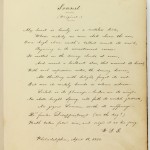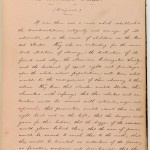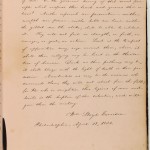William Lloyd Garrison was a prominent abolitionist and journalist, born on December 10, 1805. After his father died in 1808, he was raised in poverty by his devoutly religious mother. After running away from his carpentry apprenticeship, Garrison found work in 1818 in the newspaper business for the Newburyport Herald. Many of his lifelong views were guided by his mother’s religious fervor, and he found himself working for the Quaker periodical The Genius of Universal Emancipation for six months in 1829.
An outspoken critic of slavery, Garrison embraced radical abolitionism. He was arrested and spent forty-four days in jail for libel against a merchant involved in the domestic slave trade. He founded, edited, and managed The Liberator, which became one of the nation’sbest-known abolitionist newspapers, Its pages featured many articles written by other contributors to the friendship albums including Sarah Mapps Douglass and other members of the Female Literary Association. The Liberator’s circulation never exceeded more than 3,000 copies and lost money regularly. However, the newspaper helped to nationalize abolitionist efforts. Garrison’s radical politics were greeted with much opposition. At one time, the state of Georgia offered $5,000 for his arrest.
Garrison was one of the founding members of the American Anti-Slavery Society and a frequent lecturer on abolition. In 1834, he married Helen Benson of Connecticut. In 1844 he coined the slogan “No Union with Slaveholders.” Later, he supported a policy of secession from the South and though a pacifist, supported the Civil War whole heartedly for the sake of abolition. Later, he was a supporter of women’s suffrage. Although a well-known figure, his sphere of influence remained limited to New England.
Click the images below to explore William Lloyd Garrison’s contributions.




